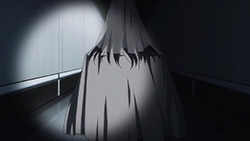 |
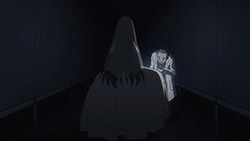 |
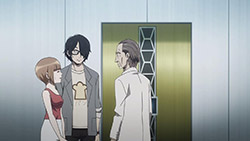 |
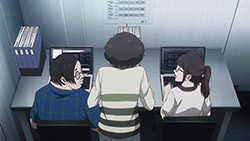 |
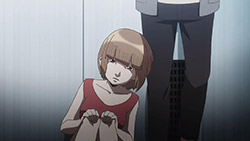 |
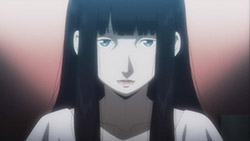 |
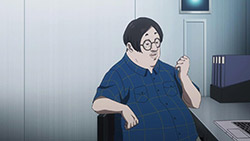 |
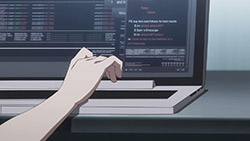 |
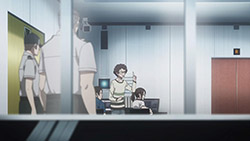 |
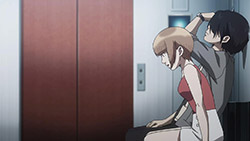 |
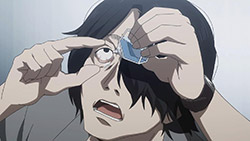 |
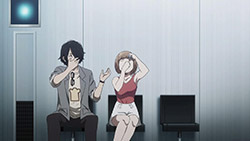 |
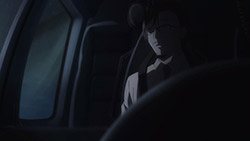 |
 |
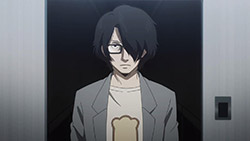 |
 |
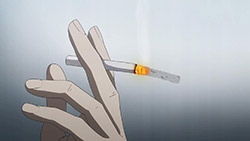 |
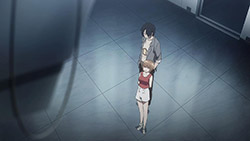 |
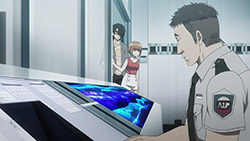 |
 |
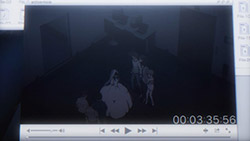 |
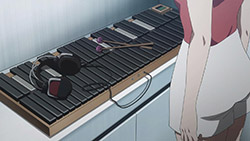 |
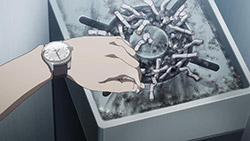 |
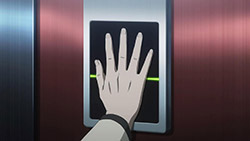 |
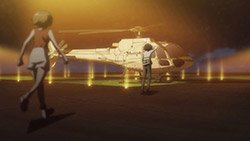 |
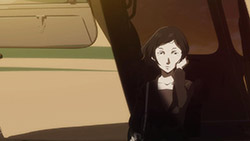 |
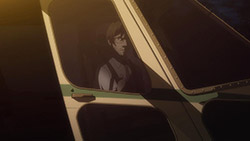 |
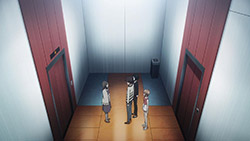 |
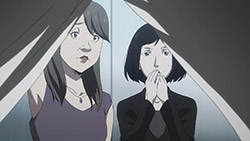 |
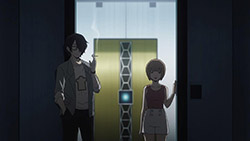 |
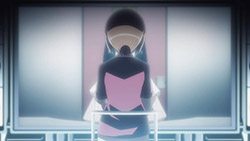 |
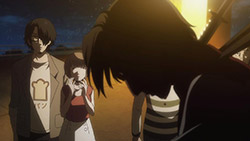 |
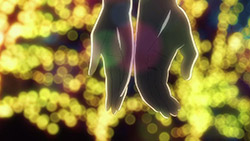 |
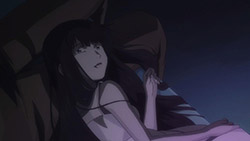 |
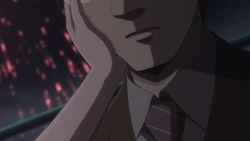 |
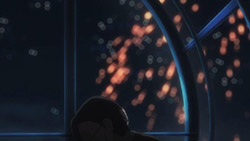 |
「赤い魔法」 (Akai Mahō)
“Red Magic”
Souhei doesn’t like expository dialogue. Leave the fourth wall alone, mate.
Subete ga F ni Naru cleaves closer to form this week, as what we have is a good ol’ locked-room murder, the perennial favourite of the mystery genre. There is only one entrance to and from Dr Magata’s room, it and the elevator to the level are constantly monitored, and the goods hatch is too small to fit a human, and also seems to be locked. A murder seems impossible, a suicide just as much. The extra twist, and what updates Subete ga F ni Naru for the modern age, is the possibility of electronic assess, especially since the body of Magata Shiki (is it?) rode out on a robot. But the titular Red Magic OS is, we have been told, completely isolated from the outside and unlikely to have an error. I’m expecting foul play from it all the same; I mean, this is your logo for Red Magic? I’m expecting Deborah to sing Daisy Bell before the season is over.
In that vein, the clues continue to pile up, though at this point in the tale we’re probably not supposed to really know what they mean yet (suddenly, a marimba? That has got to be for something). In fact, it’s fairly expected that the answers will mostly be obfuscated. Our ad hoc detective Souhei went into Deep Blue mode and seems to have figured something out (don’t ask me what the, er, dawn of man has to do with it though) but he’s cut off before we can hear most of his conclusions. I suppose we won’t have much of a mystery unless we’re all… mysterious about it. Thankfully, the facts of the case are still relatively easy to follow—again, locked-room murders should bear a certain degree of familiarity. I’m worried that the other, seemingly-unrelated-for-now details will slip through the mental cracks, though. The philosophising, and quibbles about vocabulary, the snippets of code are without the context for now, which just prompts my brain to forget about them. In particular, snippets of Moe’s past conversation with Dr Magata (I suspect they both have photographic memories, by the way) are always cryptic, in that they sound important but I can’t figure out how yet, so I just mentally pass over them. It’s probably easier in the novel, which one can marathon, but keeping track of everything on a weekly-anime basis is too difficult for me. Good thing I’m taking notes, for this blog’s sake. I suspect Subete ga F ni Naru is one of those shows that require a second watching, just to pick up on all the themes and hints that one will miss.
So, it’s not fully clear where this mystery is going (which is a good thing, I guess?), but at least it seems to be a steady ship. The other Magata sister has shown up earlier than I expected, and although she’s, disappointingly, not exactly a twin (compare), I’m still not ruling out the possibility of evil. Of course, the bigger news is that now the director is dead, without even a single line of dialogue (all he managed was to show he had a thumb). A good twist, but not necessarily a surprising kind; one death in a murder mystery would be awfully tame. Nothing spices things up like a bodycount. And it certainly won’t do for our characters to start feeling safe. We thought the killer was locked away! But someone outside is dead! How scary.
Scarier for me, though, or at least creepier, is still the continuing saga of young Magata Shiki‘s seduction of her uncle. She does get creepier by the episode, and it could just be my ingrained societal sensibilities making me queezy, but I’ll give more credit to the wailing strings in the music; beautiful, but unnerving. There is a certain relationship between horror and eroticism that has been played with since fiction was young—consider the entire mythology of vampires, probably even before Stoker immortalised the ladykilling Dracula. Terror with a hint of titillation, and vice versa. It’ll explain a lot of weird autoerotic accidents in police reports.
So it is with Subete ga F ni Naru, having the power to both repulse and intrigue. Am I looking forward to seeing what it does next week? Definitely yes, but also on some small level, no.

My guess? A robot did it!
The main characters continue to be somewhat unpleasant. Souhei is an prick. And Nishinosono is a self-entitled needy know-it-all who for all the smarts she claims she has, can’t stop acting like a fool around Souhei who is constantly smoking and being an asshole to her (not that smarts has anything to do with that).
I think the mystery itself is interesting, not enough clues to really get a grasp on it. I wonder why they couldn’t contact the police earlier (do they not have phones?/they don’t work in that facility?). Def interested in the clues we’ll find out next week. I wonder if the live-action’s characters have a better portrayal. Maybe I’ll give it a watch.
Out of curiosity, I watched the first episode of the live-action version. The mysteries are completely different (or at least they haven’t gotten to the anime one yet), so there’s nothing to be spoiled there, but the portrayals are a lot different. They give a little more backstory to Nishinosono, and her characterization is certainly a lot more likable in the live-action version (she’s seems a lot more humble), as the anime version comes off as a preening braggart. Souhei is also more likable, as he is more aloof and observant as opposed the arrogant condescending asshole we see here. I wonder how much of that just has to do with the changes that are only in the live-action adaption.
The main mystery of the anime series, essentially the Magata Shiki Introduction Arc is done right in the middle of the live-action series (episodes 5 and 6 specifically). I still haven’t got round to watching the anime yet. The live-action was great and the 2 main characters of the anime don’t really fit the characters, judging primarily on looks. It’s like both adaptations have used 2 different sets of Saikawa and Moe (S&M).
Haha, S&M! I’m guessing the anime designs must be closer to the manga, as the live-action probably doesn’t bother or need to stick to those constraints. The first episode is an hour long, so I assumed it’d eventually get to the arc we’re seeing in the anime. Overall I like it a lot more.
I haven’t watched the live-action, but I personally don’t mind the anime characters that much. At least, I bear none of your distinct hatred. To me, especially in a story like this, it’s less important that characters are ‘likable’ and more important they are consistent. Not all stories are about likable people, or even good people; much of Shakespeare is about entire casts of generally awful people, as does most Classical mythology, and indeed the Greek pantheon as a whole. I’m also helped by the fact that Souhei (who could stand to smoke less; he’s a walking chemical weapon) and Moe (she’s got a butler, what did you expect?) are very much part of the mystery themselves. If you put Souhei and Moe together, they would form Magata Shiki, and I think the question of why Moe is obsessed with Souhei will run through the entire series. This makes them no more likable, sure, but it makes them interesting, which is a fine substitute.
I don’t think the characters need to be likable either, but being hateful is a different story (they’re not mutually inclusive traits). You can still like unlikable characters as long as they’re interesting.
Moe is a self-entitled needy rich kid who’s a genius. She has to tell everyone who she is and how much influence she has (as the helicopter scene demonstrated). That makes her obnoxious..
I think the live-action version handled it better, imo of course; people knew who she was once she introduced herself, and that would fill in the blanks on their own without her having to say it herself. That presents the character in a completely different light. I’m not comparing the versions to say one is better over the other (in case anyone is thinking that), but just to show how the stark differences in characterizations.
Souhei is the same, he comes off as a too cool for school hipster d-bag who’s makes bullshit comments as @André aptly put it. Also obnoxious behavior.
The other thing is, both are supposedly geniuses, but none have really shown it for the exception of maybe Moe when she demonstrates her acumen at mathematics. They just make smart sounding comments or are downright snarky to one another, so I hope there’s more to it than that, otherwise it comes off as utterly pretentious.
Ok, end rant!
I think it’s also important to give characters the benefit of the doubt. In this case, Moe is rich and influential, and I interpreted the helicopter scene as her being helpful, since connections get you everywhere in life. By that same token, does Souhei really deserve so many ad hominems just because he has various incomplete thoughts? Filtering everything through the lens of hate makes everything look bad, not to mention wastes a lot of mental energy.
One last comparison between the two shows I promise (as it’s a pet peeve of mine when other people do it, so blah blah blah, pot calling kettle black and all that).
I get that Moe is rich and influential, but the helicopter scene had Moe tell the director to make sure to tell the police she was in the lab (cause they’d know who she was, as her uncle was the head of the prefectural police) even after someone else already told him to contact the police about the crime, so it wasn’t necessary or helpful for her to include that as opposed to the live-action version, a scene had a pair of detectives ask her name, which she gives, and from there, they conclude who her uncle is, which she confirms.
The first characterization shows someone who feels the need to include who she is first, and who her uncle is second.
Take this scene from a different set up:
Moe: “My uncle is the head/governor of the prefectural police.”
Director: “Who are you?”
Moe: “I’m Nishinosono Moe.”
This way, she’s trying to let them know who her uncle is without coming across as self-important, and she still gets to say who she is without it sounding like she’s solely saying, me me me me!. But the scene we get demonstrates her pridefulness to have to bring it up first. I’d be more willing to give it a pass if this were simply exposition, but we’ve already heard in episode 1 this information (which to be fair she brought up after she was prodded about it).
Secondly, it doesn’t do anything to help further the police in getting there or provide them with additional information about the crime, so I don’t see why it’d be helpful to include that, while in the other version, under similar conditions she does not mention it, since it’s not relevant at the time. She does however use that influence later to take a look at the case file, which while is an abuse of influence, is used as a way for her use her skills to attempt to solve the case.
And you’re right about Souhei, I certainly have a bias against him which is certainly filtering his actions, however, I’m not the only one (though that’s no excuse), but it doesn’t detract from the fact that he hasn’t really demonstrated his intelligence all that well except to treat someone poorly, which we’ve seen plenty examples of, so saying he’s an asshole/d-bag isn’t an ad hominem. Calling him a hipster is certainly more subjective, I’ll give you that, but the rest is based on blatant behavior.
I’ll chalk it up to a mileage issue, that you’re way more forgiving about it, and that’s fine, but there’s definitely a pattern of behavior to show I’m not totally just being unfair and focusing on one thing that happened way back in one episode or something.
actually live action characters are more closer to the novel ones, the anime ones i dont know… they are somehow annoying to me :/… and the adaptation of “the perfect insider” that are episodes 5 and 6 (the four previus are actually fillers, and interesting ones in my opinion) of the live action was very good, i dont know if the anime will limit to this sole book, tough i think it will because of the paece
For some reason I was expecting the younger sister to be….well, much younger. I had the impression that she would have only been very little when Shiki (apparently) murdered their parents. I have absolutely no idea why or how I came to that conclusion given the lack of information. But yeah, this impression was strong enough that I am now SERIOUSLY flummoxed.
And seeing more of the young Shiki ….chilling stuff. Or rather, the thirteen year old Shiki is chilling. The five year old version we saw in episode 1…I feel so sad for her. Where did she go and how did she morph into a seductress , murderer, shut in and finally mutilated corpse. I’m really curious about all that and am definitely hooked to this as a result….but I’m almost scared as to how things will turn out.
I had dastardly Umineko incestuous vibes that gave me the shivers when I saw that scene with young Magata and her uncle. Ack. Just leaves bad taste in my mouth. Also, hints of The Ring? You know, the movie where Sadako was split into two due to her psychic juju and her split personality was a really creepy little girl who would eventually crawl out of your TV to kill you in seven days if you watched this stupid tape and didn’t pass it out-
Oops.
Point is, young Magata just spells like bad news to me. Thankfully, this is a mystery and not outright horror. The atmosphere they have going for the show is amazing, but the characters are just… meh. Thankfully, you don’t need likable characters to keep a mystery going.
Maybe the meaning is whooshing right past me, but I thought that the man 13yo Shiki is seducing is Moe’s father, professor Nishinosono, not her literal uncle – the usual Japanese confusion with addressing people to be blamed, onee-san/ojii-san etc. Which makes it more cohesive in the core, Shiki obviously has parental issues even when we see her at five and it is her sensei she converses with about it. Would it be so far-fetched to think that by the span of the following few years it festered to the daddy complex and subsequently the whole sketchy business she was up to when she turned 13?
I’m also toying with the idea that her requirement for loving an adult was them being smarter than her, and the whole seduction sutiuation was somewhat a ploy to outsmart Nishinosono by all means possible, cooked up together with a very blurred line between intellectual admiration, familial and romantic love. Tacked on to that, could it be that she killed her parents after being disappointed that their intellectual capability was below hers, and then, possibly, did in Nishinosono (and his wife?) too. We never got any details on why Moe’s parents were deceased. Given Shiki’s history with the professor, Souhei, who due to being his last student knew at least part of it, would have more motives to be fascinated with Magata. And if we are feeling particularly wild in our theorising, maybe color Moe’s obsession with Souhei with some daddy projection as well. Kind of a longshot but what the hell. Theraphy for everyone.
On a separate note, I can’t draw my mind away from the name of the whole thing – the perfect insider. Who IS the perfect insider? Obviously there’s some inside job going on, but I have a feeling that we have something obnoxiously obvious hidden in plain view, the one that will make everyone go ‘of-fucking-COURSE’ when it will finally be revealed.
The director’s behavior was shady as hell. The cornerstone of the work he dedicated half of his life to is gone, not to mention that a person is killed which last time I checked it kind of a big deal, and he was basically flatlining the whole thing. At least step out of the chopper you prick. The fact that he bit it directly afterwards makes me wonder whom he was hiding there. And, while we’re on it, why is the little sister on the island anyway. The story makes great care to curb our questions though by making basically everything as detached from each other and confusing as possible. We hardly every hear any conversation from start to finish, objects are shown from unsettling points of view and angles, seemingly random things pop up here and there (that marimba). And as you said, Passerby, the weekly format doesn’t help. I’m making a physical effort to prevent my twitchy fingers from connecting with the keyboard and spoiling the everloving daylights outta myself.
>] “I’m also toying with the idea that her requirement for loving an adult was them being smarter than her, and the whole seduction sutiuation was somewhat a ploy to outsmart Nishinosono by all means possible, cooked up together with a very blurred line between intellectual admiration, familial and romantic love. Tacked on to that, could it be that she killed her parents after being disappointed that their intellectual capability was below hers, and then, possibly, did in Nishinosono (and his wife?) too. We never got any details on why Moe’s parents were deceased. Given Shiki’s history with the professor, Souhei, who due to being his last student knew at least part of it, would have more motives to be fascinated with Magata. And if we are feeling particularly wild in our theorising, maybe color Moe’s obsession with Souhei with some daddy projection as well. Kind of a longshot but what the hell. Theraphy for everyone.”
Interesting theory, but let’s examine that premise some more. You suggest that Shiki only “loves” those whom she sees as being smarter than her, but I’d argue that the only real love there, if you can even call it that, is purely a self-satisfying one. People are but a means to an end for her; a theory reinforced by the idea that she might’ve killed her parents simply because she saw them as being inferior to her.
However, even all that’s naught but the ramblings of a little mind, IMO. Ultimately, this episode left me feeling just as I had about Shiki as I did at the end of the first episode; that she’s an empty individual who never did a single thing that she felt she could take pride or satisfaction in in life.
Oh, I totally agree, all people of Magata’s world are merely tools or filters for her to come back to herself in the end. But to be fair, any love will be ultimately the self-satisfying one – in the end of the day, while generally defined by objective criteria, conditions and I guess symptoms if you will, love is a subjective and a matter of perception. Who is to say that Magata’s ‘love’ is not basically the feeling of elation she gets comparing someone to herself and coming out on the losing end? I’m not saying it’s healthy or normal but hey, that assumption was off the table to begin with.
It’s a distinct possibility that I should really take into consideration, yes. By all means, continue the speculation; it is the fuel of discussion on mystery anime. I would note, though, that Dr Magata was ultimately found innocent for the murder of her parents, because she lacked the appropriate mental state. And psychopathy does not excuse one for murder.
“I would note, though, that Dr Magata was ultimately found innocent for the murder of her parents, because she lacked the appropriate mental state. And psychopathy does not excuse one for murder.”
Remember that Japan is extremely lenient when it comes to crimes involving youths, even when the crime is murder.
Also there was that famous case where a Japanese student killed and cannibalized a woman in France, but after deportation and a series of legal hiccups, he was declared “sane” and ended up being released back into society. Truly bizarre stuff.
The romanticization of ‘innocent young’uns’… Blegh… This is becoming more of a trend in the U.S as far as I could observe. But what’s most ironic is that people came of age earlier in centuries past then they do now; gee, I wonder what happened.
Y’know, just because the human brain does not technically fully mature until it’s 25 years of age does not excuse irresponsible, disturbing and immoral behavior. And it most certainly does not mean that one is incapable of making decisions or judgements, especially once a sense of self as a distinct, separate entity has been fully formed. In fact, the more knowledge, responsibility and power you provide, the faster the brain matures via the strengthening and utilizing of neural connections. Unless of course, if the powers that be insist on your youthanization– on your infantilization.
Psychopathy does not excuse from a murder charge but it DOES help to put an additional unsettling sheen on the actions and motivations of a murderer; conjured with Magata’s insistent explanation that a doll did it(?) and the fact that a genius, vaguely autistic 14yo girl killed her parents – which already lies so outside of society’s moral comfort zone it practically prompts the suggestion of some mental prolapse – I could see how she could be seen unfit to stand the trial. Especially since she nonetheless ended in prison by some other name.
It’s so funny how the main guy is supposed to be genius, but he is yet to say anything smart… Really, 3 episodes and I still haven’t seen him saying something useful…
He makes a lot of hipsters BS comments, but that’s pretty all he has done until now… The annoying girl with a stupid haircut is a lot more interesting than him.
Exactly this, Souhei makes a lot of hipster BS comments, and has this hipster devil may care attitude which makes him sorta hateful.
In other words, pretentious you mean. Thinking back on it a certain way and the dude certainly comes off like that.
yeah, I eventually just called his behavior pretentious, though I think Moe falls into this category too at times.
The plot is the only thing that is making me watch this. I’m still waiting for sensei to say something smart too, aside from alluding red to communism and blood. Moe on the other hand, irritates the hell out of me. I don’t know her point about snatching his eye drops and putting them in. Pretentiousness and self entitlement? Aside from her quick math skills, she hasn’t contributed much, aside from throwing her surname around.
And haha, yeah, they gave Moe a stupid haircut. It reminds me of Heroes Reborn. They gave the lone female Japanese character an awful haircut which makes her look terrible.
The Bob cut just doesn’t suit her, especially with those outfits she wears. Personally, Bob cuts look better on taller individuals with sharp facial features donning futuristic clothing. This is just bad fashion sense yo~
Actually, in the novel, Moe have short haircut like the anime, so in a way, it’s the live action that is not faithful to the novel. I like the anime more than the live action BTW, because it’s much more faithful than the live action. In the novel, Saikawa is more apathetic just like this anime, while live action one he actually seems much more friendlier.
Drinking game : take a hit every time someone says “fifteen years”, try not to die by the end of the episode..
I’m pretty sure the director was already dead when they talked to him inside the helicopter.
Also: the mutilated corpse probably isn’t her.
(Random guesses. Appropriate for a site called Random Curiosity).